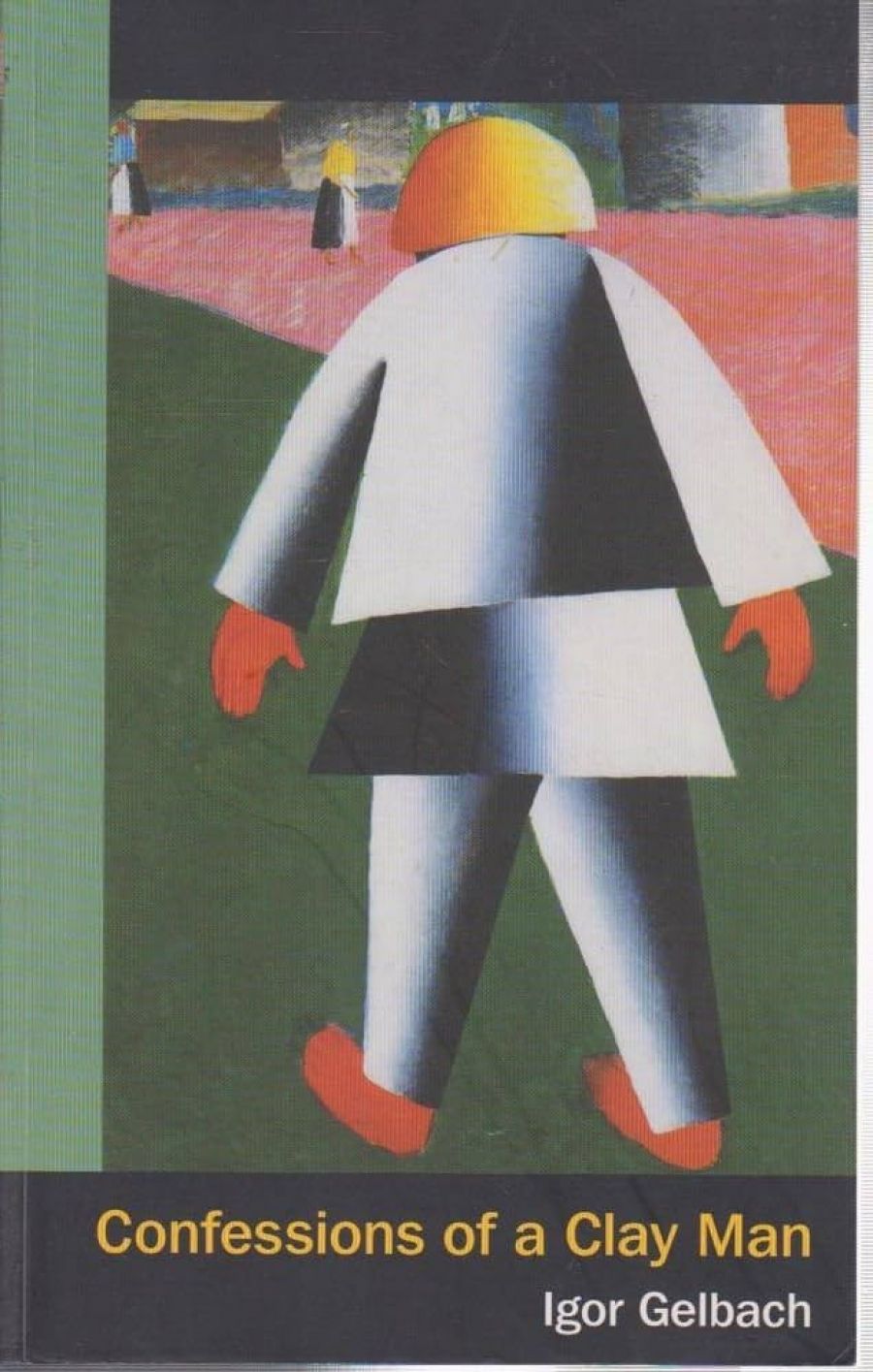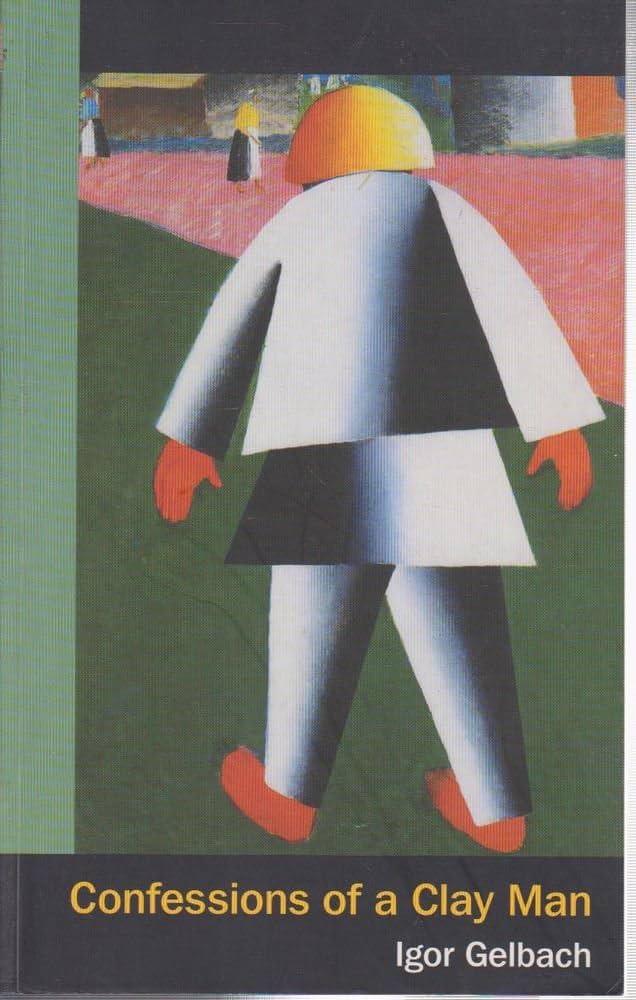
- Free Article: No
- Contents Category: Fiction
- Review Article: Yes
- Article Title: The Dreaming Plot
- Online Only: No
- Custom Highlight Text:
The Russian theorist Yuri Lotman said: ‘Plot is a way of understanding the world.’ On this basis, texts with plots – novels, for example – do more for us than texts without plots. The telephone book, for example, a plotless text par excellence, may promote aspects of communication, but adds little to our attempt to make sense of life. However, Igor Gelbach, a Georgian Russian now living in Melbourne, has challenged this concept with his thought-provoking but virtually plotless novel, Confessions of a Clay Man, which may be narrative in shape but is highly poetic in procedure. At first reading, it is rather mystifying, the story so fabulised that you tend to lose it and concentrate on the word-pictures, which manage to make a completely unknown place hauntingly evocative, as though you had once dreamed about it. Like Goethe’s ‘Land wo die Zitronen blühn’, we can’t know it, but we feel as though we do. Gelbach’s seaside town resonates with a similar, impossible familiarity.
- Book 1 Title: Confessions of a Clay Man
- Book 1 Biblio: Brandl & Schlesinger, $26.95 pb, 188 pp
- Book 1 Cover Small (400 x 600):

- Book 1 Cover (800 x 1200):

So, what is it about Georgia and the Black Sea that so captivates writers and readers? Works as different as Isaac Babel’s brilliant short story ‘My First Fee’ and Neal Ascherson’s splendid work of non-fiction simply called Black Sea have already made the place unforgettable; now Gelbach does it again, on almost every page. The background is always foregrounded in seductive allusions to beguiling colour and scents to swoon for: ‘[T]he dark and dense green of the cypress like a hopelessly dry theatre-set juxtaposed with the pitiless deep dark blue of the sea, its syncopated sighing and tranquil caressing touch, the swelling darkness of its nights, bursting into blue-black emptiness, festooned with blue-green lanterns of an overpowering perfume — the magnolias of early summer.’
Gelbach, who lived in a town on the Black Sea for twenty years, writes through a character called Bronhauser, whose idiosyncratic thoughts draw deeply on memory. But, as the world knew even before Freud told us, the narrative of memory and dreams does not obey the strictures of chronology, although it is usually the self-appointed task of ‘the narrator’ to work random flashes of reminiscence into a sequential story, even if s/he then artfully distorts it. But in Gelbach’s novel, surges of memory dictate the narrative far more strongly than the logic of what happens next, prompting the reader to furtive attempts to work out who did what with whom and for how long. After the second reading, an uncertain storyline can be pieced together. Bronhauser Senior (which is how the narrator refers to his father) was a doctor in this town. In 1942, he married a tall green-eyed woman, but was then sent off to the war and the camps. She gave birth to Bronhauser Junior, but drifted into another relationship with a theatrical producer called Vakhtang Nikolaevich. Bronhauser Junior had no objection to his stepfather, but eventually chose to use his real father’s name and even follow the same profession. Studying medicine in Leningrad, he meets Yata, the most significant but not the only woman in his life. She follows him back to the Black Sea, where he conducts biological research on the monkeys attached to the institute in which Yata is confined after she has a breakdown.
It is tempting to interpret many of the incidents that happen down in Georgia (Stalin’s birthplace) as oblique but more benign reflections of the grimmer goings-on in the Soviet Union. Bronhauser’s monkey research reminds one that in Stalin’s Russia experiments were performed on human beings and that psychiatric hospitals were often euphemisms for prison. (The poet Mandelstam was confined and maltreated in one such institution.) Shortly after his return, Bronhauser is arrested and imprisoned on suspicion of being an accomplice in some minor crime; unlike the fate of many Russians, he has a lawyer and is released after six months, but the nearest we get to any political comment is his meditation: ‘Towards the end of my time in prison I came to understand that my expectation of early release had been founded essentially on an unconscious belief in the intimate link between judgment and justice, a link which has never actually been proved. Having grasped that, I still hadn’t the slightest idea to what I owed my freedom.’ (Many Soviet prisoners had as little idea to what they owed their much longer incarceration.) A certain Professor Stein, who had taken part in the development of the hydrogen bomb, finds himself exiled to the Black Sea town during an ‘anti-cosmopolitan’ campaign, having had no idea that he would ‘turn out to be a cosmopolitan’ – in Stalin-speak, a Jew. And is the powerful Sandro Akakievich – a thug despite the contrary literary associations of his name (with the Georgian writer Iskander and the owner of Gogol’s ‘Overcoat’) – a member of the KGB or just of the local mafia? We’re not told, either because the author doesn’t care, or because such questions could not be asked. Even Bronhauser Junior, cynically embroiled in one of Sandro Akakievich’s conspiracies, has no clue as to what it’s all about.
Yes, a few things do eventuate that might look like the beginnings of a plot, in whatever sense you like. The point is not to try to drag them into some kind of order, but simply to watch them unfurl before your dreaming eyes while you revel in the lambent green of eyes and leaves, and the permeating perfume of oleanders.


Comments powered by CComment